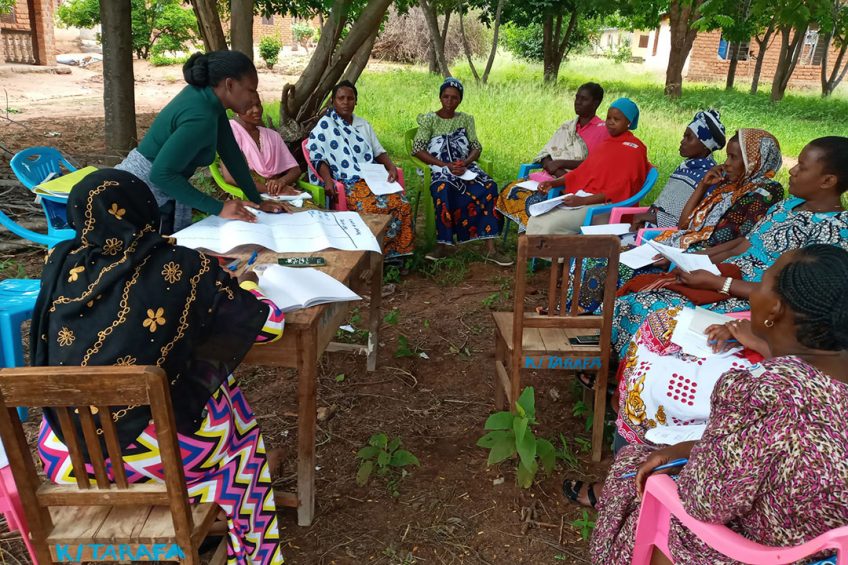Genetically improving resilience to Newcastle Disease

A team of international scientists in Africa and the United States are developing strategies to genetically improve the resistance of chickens to Newcastle Disease virus in indigenous chickens in Africa.
Newcastle Disease (ND) is endemic and poses a substantial threat to small-scale poultry production across the African continent where family poultry – the raising of poultry by individual households for food security and income – is an integral and significant part of the farming system. Highly pathogenic strains of the ND virus (NDV) can lead up to 100% mortality in affected flocks resulting in significant losses. Vaccination can be an effective approach to prevent ND outbreaks, however, the logistics of distributing the NDV vaccine is challenging in rural areas with limited extension services and reliable cold-chain storage.
Genetically improving resistance to NDV
The Genomics to Improve Poultry Innovation Lab (GIP-IL), which was launched in 2013 with a grant from USAID, is a multidisciplinary team of scientists working toward the goals of the US government’s Feed the Future initiative. The GIP-IL is developing strategies for genetically improving resistance to NDV in local chickens in Africa by applying the latest genomics technology to identify the most robust genes and markers associated with resilience to NDV in indigenous chickens in Ghana and Tanzania. The research teams in the US, Ghana and Tanzania have identified multiple genetic markers, biomarkers, and indicator traits associated with ND resistance, ND vaccine efficacy, and other economically important traits (e.g. egg production and growth rate) to be integrated into a genetic selection platform. The genetic selection platform will be used for selection and breeding of local chickens with improved resilience in the face of NDV.
 Preventing vaccination failure in poultry flocks
Preventing vaccination failure in poultry flocks
Vaccines are used to prevent disease outbreaks when a flock is exposed to field disease organisms. From time to time, vaccination failure occurs. Poultry World sums up the factors necessary to avoid inadequate vaccine protection.
ND resistance in poultry is a complex polygenic trait
Huaijun Zhou, director of GIP-IL and Animal Science Professor at the University of California, Davis, said genomic analyses suggest that ND resistance in poultry is a complex polygenic trait that is controlled by a large number of genes of small individual effect, but that results look promising for genetic selection as a complimentary approach to vaccination for NDV prevention and control.
Evaluate the effectiveness, affordability, and sustainability
In parallel, the GIP-IL is conducting a poultry value chain assessment in Ghana and Tanzania to assess potential demand for genetically improved indigenous chickens and to identify constraints and opportunities that may impact producer uptake of the improved lines. The assessment will evaluate the effectiveness, affordability, and sustainability for breeding and distributing the improved lines to smallholder farmers. Part of this evaluation is to help identify ways to effectively involve women farmers as actors in the value chain.
 Newcastle disease in chickens spreads easier than wild birds
Newcastle disease in chickens spreads easier than wild birds
Virulent Newcastle disease viruses from chicken origin are more pathogenic and transmissible to chickens than viruses normally maintained in wild birds.
Involving more female farmers
In these assessments, women in Ghana and Tanzania have emphasised the challenges associated with accessing veterinary therapeutics, including poultry vaccines, given the lack of agrovets and women’s limited access to transportation in remote areas.
Women farmers have to rely on men to access poultry health services
The women also expressed concerns about not feeling heard when seeking animal health care services from veterinary officers who they perceive to listen to, and address needs communicated by men more than women. Women often relied on men to access animal health services and consequently, women’s ability to independently manage and benefit from their chickens was limited. The results from the assessments reveal the need to establish reliable models of input delivery to enhance supply of quality drugs and vaccines in rural areas and to reach women, in particular. Such models could be extended to enhance women’s access to the chicken ecotypes with enhanced ND resistance.
![]() Poultry Health Tool
Poultry Health Tool
With the latest insights on the 40+ most common poultry diseases.
Strengthened human and institutional capacity in poultry research
Over the past 7 years, the programme has strengthened human and institutional capacity in poultry research, genetics and breeding in Ghana and Tanzania. The GIP-IL has established facilities for poultry breeding and research at the University of Ghana (UoG) and Sokoine University of Agriculture (SUA) in Tanzania, trained students and staff in infectious diseases, genetics/genomics, and poultry science.
Raise awareness of smallholder farmers on best practices
Furthermore, engaging communities through outreach activities has been a key component of the programme aimed to increase awareness of smallholder farmers on best practices for poultry husbandry and disease prevention and control.
Placing heartier chickens in the hands of producers
Over the next 2-3 years, Zhou said the programme will apply the innovative selection platform to initiate genetic selection and breeding and validation of ND resistance in African local chickens. Achieving these outcomes will ultimately place heartier chickens in the hands of producers in vulnerable areas around the world. The GIP-IL is led by the University of California, Davis, in partnership with Iowa State University, Sokoine University of Agriculture, University of Ghana, and International Livestock Research Institute.













